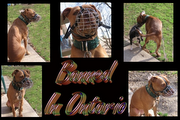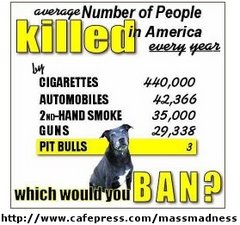Law with Bite & Ban Behaviour, not Breeds
In an Seatle Times editorial, it seems they are starting to get the idea. I like their definition on dangerous dogs on deeds, not breeds and dog owners need to be kept accountable. Now isn't that the same message we've been trying to get through to governments?
This may only be two small towns in the U.S., but it's a start in the right direction.
A law with bite
The small town of Ontario, Ore., made news this week when it announced it is slapping a $100 annual fee on dogs deemed dangerous.
Like many cities and towns, the small community on the Oregon-Idaho border has to strike a balance between community safety and the rights of pet owners, with emphasis on community safety. Both Ontario and Seattle, appropriately, base the definition of dangerous dogs on deeds, not breeds. Yes, cities keep a list of dogs involved in unprovoked attacks on people. No barking — they have to.
There are plenty of friendly, non-dangerous pit bulls and rottweilers and plenty of teeth-gnashing poodles and dachshunds.
Both communities are right to emphasize public safety.
In Seattle, an unprovoked first bite prompts a $269 fine, and the canine gets a record.
After a first bite in Ontario, the dog must be kept in a five-sided pen and have a microchip installed. Under the new law, the owner also would pay a new, $100 annual licensing fee, on top of a regular $20 license.
Dogs get two strikes in both locations. After two bites, city officials attempt to remove the dog to the pound. It sounds harsh, but strong action is necessary.
Due process is followed. The owner can explain mitigating circumstances, such as how Fido or Road Warrior was provoked.
Seattle, many experts believe, has more dogs than children. The city, with special dog parks, caters to dog owners. Businesses selling goodies for dogs are flourishing.
But Northwest communities also are places where runners, bikers, dog walkers and dogs left off the leash collide
No community should love dogs so much that they are allowed to endanger others.
Two strikes and you're out works. And fines are a good way to send the message that dog owners will be kept accountable.
And in the Boston News comes this editorial.
Ban behavior, not breeds
May 17, 2007
DANGEROUS DOBERMANS, Rottweilers, German shepherds, or any other dog breeds would get a pass under any legislation that focuses exclusively on banning or restraining pit bulls. Massachusetts needs a sound state law that addresses vicious dogs of every type, not breed-specific laws that fail to differentiate between behavior and brand.
The Legislature's Joint Committee on Municipalities and Regional Government is exploring a statewide pit bull ban similar to those adopted by some municipalities across the United States.
Sympathy for such restrictions comes easily to the public after sickening incidents such as last week's pit bull attacks on two children in Boston. And the breed does appear to be favored by hostile owners who could draw out aggressiveness in the meekest lamb.
But banning pit bulls, most of which make reasonably good pets if treated properly, misses the wider point.
Vicious dogs, regardless of breed, do not belong in any home or neighborhood. But current state law does not even define what constitutes vicious behavior.
Erratic enforcement efforts rest almost exclusively in the hands of municipalities. The state contributes with outmoded legislation recommending a first-offense fine of not more than $25 for any owner who ignores local dog ordinances. That's no hardship for people who pay more for a case of premium dog food.
New Bedford is taking a tough and sensible approach to the problem.
The South Coast city's dangerous-dog ordinance would never be described as soft on ferocious canines. The law not only addresses actual attacks on people but also gives an animal control officer leeway to find a leashed dog dangerous if its actions are so aggressive as to suggest that an attack would have taken place if not for the presence of the restraint.
No specific breeds are cited in the ordinance. But there are plenty of specific consequences if a dog is deemed dangerous, including: mandatory spaying or neutering of the animal; mandatory microchip identification; mandatory confinement behind a fence; a total ban within 500 feet of a playground or park; and euthanasia at the discretion of the city's animal control officer. Owners of vicious dogs can face licensing surcharges, mandatory insurance, and fines up to $300 daily for failure to comply with the ordinance.
The Massachusetts Society for the Prevention of Cruelty to Animals, which opposes breed-specific bans, endorses a Senate bill (S. 512) that is scheduled for a fall hearing in the Legislature. It provides strictures like those in New Bedford while mandating extensive training for animal control officers.
Less preoccupation with pit bulls should lead to laws that minimize the likelihood of dog bites and maximize the penalties for owners whose callousness is often at the root of the attacks.





























